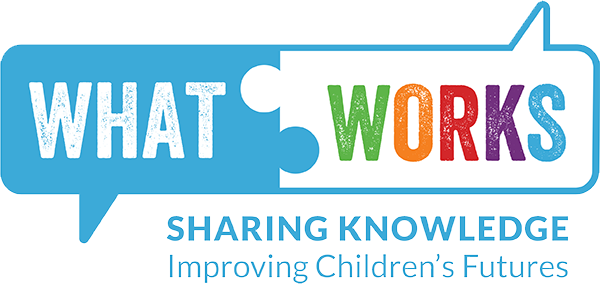Pyramid Club Primary

Pyramid Club is a targeted programme for children who are identified as being quiet, shy, and behaviourally more likely to internalise. Pyramid Primary is provided to children in primary school, with activity content and material tailored to this group.
Pyramid clubs run once a week for 10 weeks. The clubs are run by trained leaders, usually as an after school activity, but sometimes during the school day. Activities at the club are structured around circle time, art and craft, games, and food.
Each session runs for 90 minutes with up to 12 children and three club leaders. Pyramid Primary is provided to children in primary school, with activity content and material tailored to this group.
EIF Programme Assessment
Child outcomes
This programme can affect outcomes for children in Active and healthy, physical and mental wellbeing.
According to the best available evidence for this programme's impact, it can achieve the following positive outcomes for children:
Supporting children's mental health and wellbeing
Decreased emotional problems (teacher report)
based on study 1
Increased emotional intelligence (teacher report)
based on study 1
Preventing crime, violence and antisocial behaviour
Decreased peer problems (teacher report)
based on study 1
Decreased total difficulties score (teacher report)
based on study 1
Increased pro-social behaviour (teacher report)
based on study 1
This programme also has evidence of supporting positive outcomes for couples, parents or families that may be relevant to a commissioning decision. Please see About the evidence for more detail.
Who is it for?
The best available evidence for this programme relates to the following age-groups:
Primary school
How is it delivered?
The best available evidence for this programme relates to implementation through these delivery models:
- Group
Where is it delivered?
The best available evidence for this programme relates to its implementation in these settings:
- Primary school
How is it targeted?
The best available evidence for this programme relates to its implementation as:
- Targeted indicated
Where has it been implemented?
- England
- Northern Ireland
- Wales
Ireland provision
Ireland evaluation
About the programme
What happens during the delivery?
How is it delivered?
- Pyramid Club is delivered in 10 sessions of 1.5 hours’ duration each by three practitioners to groups of 8-12 children.
What happens during the intervention?
- Pyramid Clubs begin and end with circle time. Circle time takes the form of collaborative group discussions which gives children the opportunity to listen and speak.
- Clubs involve art and craft, which provides the opportunity to be creative.
- Games are played, which are typically team based and promote negotiation and collaboration.
- Food preparation and sharing is also a core activity, which provides opportunities to develop skills, acknowledge different cultures and understand people’s likes and dislikes.
What are the implementation requirements?
Who can deliver it?
- Pyramid Club is delivered by a school or voluntary organisation staff member or volunteer with recommended NFQ-level 6.
What are the training requirements?
- School or voluntary organisation staff have 10 hours of training and volunteers have 15 hours. Booster training of practitioners is recommended.
How are the practitioners supervised?
- It is recommended that practitioners are supervised by one external supervisor, qualified to NFQ-level 9/10, who receives six hours of training per year.
What are the systems for maintaining fidelity?
- Training manual,
- Other printed material,
- Other online material,
- Face-to-face training,
- Fidelity monitoring
Is there a licensing requirement?
There is a licence required to run this programme.
How does it work? (Theory of Change)
How does it work?
- Strong socio-emotional competences will enable children and young people to achieve their full potential in school and in life.
- Pyramid clubs allow children to observe and practise coping skills and encourage effective social interaction with both peers and adults, developing increased socio-emotional competence.
- In the short term, children and young people who attend Pyramid clubs demonstrate better emotional self-management, improved peer interaction and greater school engagement.
- In the longer term, improvements in socio-emotional competence in childhood reduce the likelihood of mental health problems and other difficulties in later life, such as failure in school and job instability.
Intended outcomes
- Achieving in all areas of learning and development
- Active and healthy, physical and mental wellbeing
- Safe and protected from harm
Contact details
Bronach Hughes
Pyramid Project Co-ordinator
pyramid@uwl.ac.uk
About the evidence
Pyramid Primary’s most rigorous evidence comes from an RCT conducted in the UK.
This study identified statistically significant positive impact on a number of child outcomes. The conclusions that can be drawn from this study are limited by methodological issues pertaining to a lack of intention-to-treat analysis and high overall attrition (without analysis of whether those who drop out of the programme and those who complete the programme differ), which is why a higher rating is not achieved. This programme is underpinned by one study with a level 2+, hence the programme receives a level 2+ rating overall.
Study 1
| Citation: | Cassidy et al (2015) |
| Design: | RCT |
| Country: | United Kingdom |
| Sample: | 630 children were randomised, consisting of two cohorts of pupils: ages seven to eight years (‘Pyramid Primary’) and aged 11 years (‘Pyramid Transition’). All presented as quiet, shy, and behaviourally more likely to internalise |
| Timing: | Post-intervention and 12-week follow up. |
| Child outcomes: |
|
| Other outcomes: | |
| Study rating: | 2+ |
Cassidy, T., McLaughlin, M., & Giles, M. (2015). Socio-emotional health in school children: An emotion-focused intervention. International Journal of School and Cognitive Psychology, 2(4), 1–7.